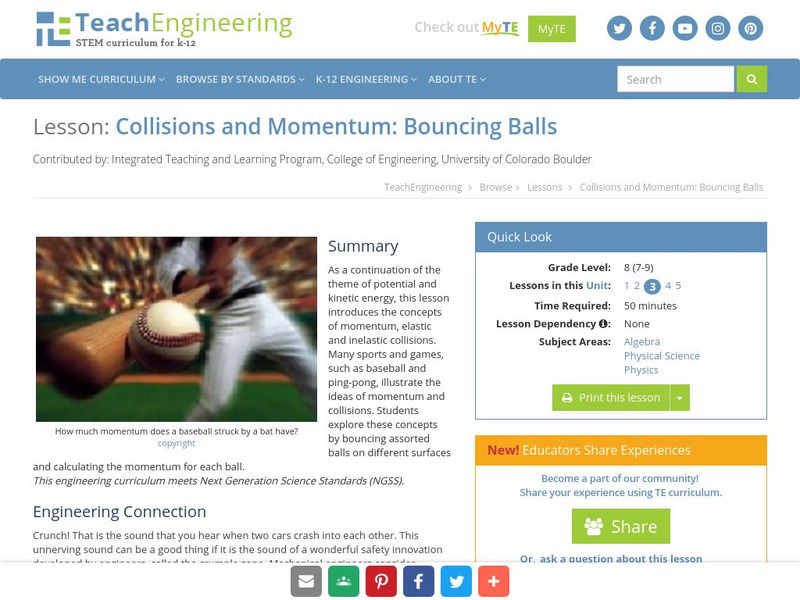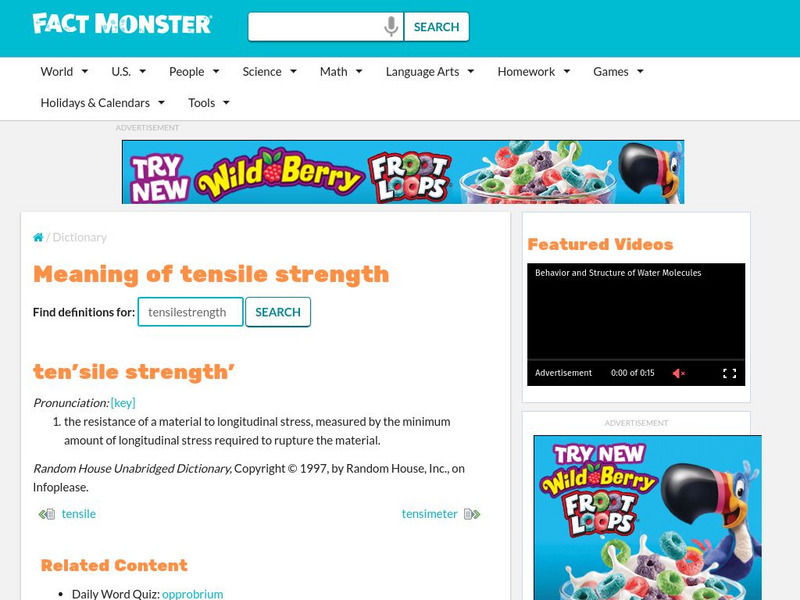E-learning for Kids
E Learning for Kids: Science: Loch Ness: What Properties Do Materials Have?
This lesson looks at how the physical properties of materials determine how they can be used, and students decide which materials are strong, hard, soft, or transparent.
Physics Aviary
Physics Aviary: Practice Problems: Distance Traveled (Fired by a Spring)
Students must predict the distance traveled by a box that has been projected horizontally by a compressed spring. The box will start with potential energy due to elasticity and it will turn into KE without loss. It will then lose its...
Physics Classroom
The Physics Classroom: Momentum and Collisions: Collision Carts Activity 1
A virtual collision track with colliding or exploding carts allows students to explore elastic and inelastic collisions. They can vary the mass of the two carts and their pre-collision velocities. An accompanying activity sheet which...
Physics Classroom
The Physics Classroom: Momentum and Collisions: Collision Carts Activity 2
A virtual collision track with colliding or exploding carts allows students to explore elastic and inelastic collisions. They can vary the mass and velocities of the two carts. An accompanying activity sheet which focuses on elastic...
Physics Aviary
Physics Aviary: Elastic Lab
This lab was designed to have students test the relationship between the force applied to a spring and the length of the spring. Students can work with 7 different springs.
BBC
Bbc: Gcse Bitesize: Forces and Elasticity Aqa
This lesson focuses on forces and elasticity. Forces are responsible for changing the motion of objects. If more than one force is present, the shape of an object can also be changed. A link to a test is provided.
Science Struck
Science Struck: The 13 Types of Energy and Their Applications
Read about all the different kinds of potential and kinetic energy. Includes energy formulas and examples of energy applications.
TeachEngineering
Teach Engineering: Collisions and Momentum: Bouncing Balls
As a continuation of the theme of potential and kinetic energy, this lesson introduces the concepts of momentum, elastic and inelastic collisions. Many sports and games, such as baseball and ping-pong, illustrate the ideas of momentum...
Khan Academy
Khan Academy: Calculating Elastic Potential Energy
Practice calculating the elastic potential energy stored in a spring.
MadSci Network
The Mad Scientist Network: Bouncing Rubber Ball
A question and answer format is used to relate elastic potential energy to the bounce of a rubber ball. Explanation of this simple phenomenon is thorough, complete, and free of trite statements.
Wolfram Research
Wolfram Science World: Strain
Strain is defined and an equation is stated. Examples of material strain are given and the response of materials to strain is discussed. Includes links to related topics.
Other
University of Winnipeg Physics Dept: Deformation of Solids
This page from the University of Winnipeg Physics Department and the three pages which are linked to it describe the relationship between the strain and the stress experienced by a material. The elastic modulus is defined and an equation...
McGraw Hill
Mc Graw Hill Learning Center: Rigid Bodies and Rotational Motion
From the companion web site for the Contemporary College Physics web site. The collection of pages indexed from this page lead to a variety of useful resources pertinent to Chapter 9 (Rigid Bodies and Rotational Motion) of the book. Such...
Fact Monster
Fact Monster: Tensile Strength
Presents a simple definition of the phrase "tensile strength."
Johns Hopkins University
Johns Hopkins University: Properties of Solids
From the General Physics for Bio-Science Majors web site. Several properties of solids, many of which pertain to the elasticity of materials. Stress and strain are defined and Young's modulus is explained. The Young's modulus equation is...










